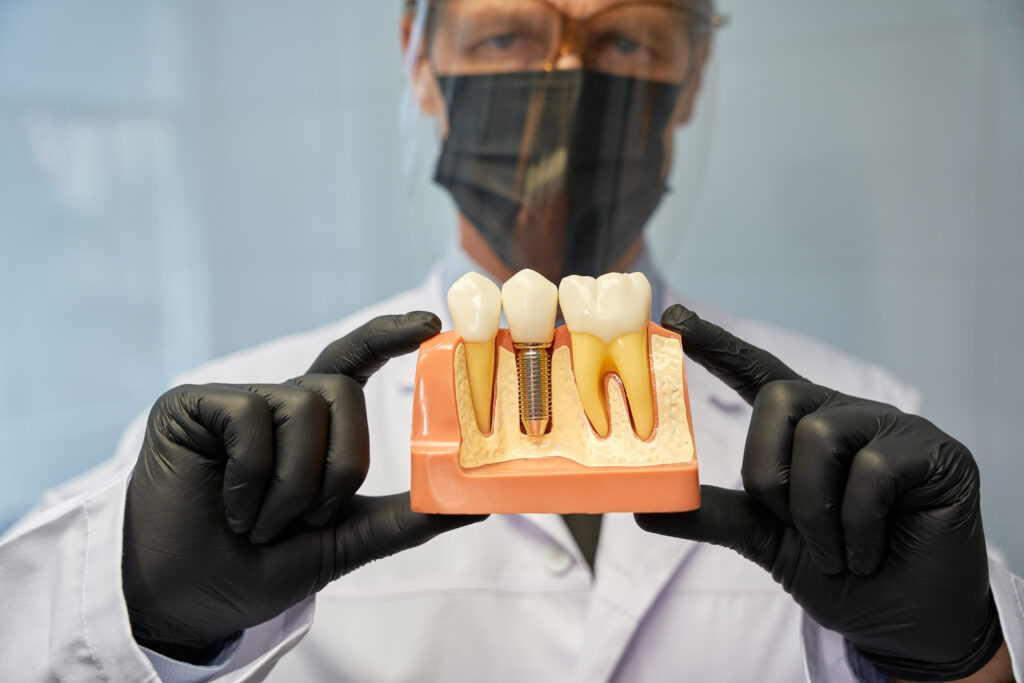
Replacing missing teeth is a crucial part of maintaining optimal oral health. But when it comes to choosing between dentures versus implants, how can you decide what’s best for you? At Absolute Smile, we strive to give you the information you need to make the best decision for your oral health.
This article will explore the difference between implants and dentures. Remember that the choice between dental implants and dentures is personal and, most importantly, should align with your unique dental needs.
What Are Dental Implants?
Dental implants are titanium posts that are surgically placed into the jawbone to replace missing teeth. Over time, the implant fuses with the jawbone in a process called osseointegration, creating a strong foundation for attaching dental crowns or bridges. Dental implants offer a natural-looking and functional solution, closely resembling natural teeth in appearance and functionality.
They also help preserve the jawbone by stimulating it, preventing bone loss. With proper care, dental implants can last a lifetime, making them a durable and cost-effective option for tooth replacement.
What Advantages Do Dental Implants Offer?
Maintains Jawbone Integrity
One of the most significant advantages of dental implants is their ability to maintain the integrity of the jawbone. When a tooth is lost, the jawbone can begin to deteriorate over time. Dental implants act as artificial tooth roots that securely fuse with the jawbone, stimulating it and preventing bone loss. This not only preserves the natural shape of the jaw but also helps maintain overall facial structure.
High Success Rate
Dental implants have a remarkably high success rate. When performed by a qualified and experienced dental professional, the success rate of dental implant procedures is around 95-98%. The titanium post used in dental implants has excellent biocompatibility, meaning it integrates well with surrounding tissues without causing any adverse reactions. This high success rate ensures that patients can enjoy the benefits of dental implants for many years to come.
Easy to Maintain
Maintaining dental implants is as simple as caring for natural teeth. Unlike dentures or dental bridges, which require special cleaning techniques and removal for maintenance, dental implants are treated just like regular teeth. Regular brushing, flossing, and routine dental check-ups are sufficient to keep your implants clean and healthy. This ease of maintenance makes dental implants a convenient and hassle-free option for tooth replacement.
Durable and Long-Lasting
Dental implants are renowned for their durability and longevity. Made from high-quality materials like titanium, dental implants are designed to withstand the forces of biting and chewing. With proper oral hygiene and regular dental care, dental implants can last a lifetime.
This long-term durability makes dental implants a cost-effective investment in your oral health, sparing you from the need for frequent replacements or repairs associated with alternative tooth replacement options.
What Are Dentures?
Dentures are a common and effective solution for individuals who have lost all or a significant number of their natural teeth. Dentures are custom-made to fit the unique shape of a patient’s mouth and can be made to replace either a full set of teeth (complete dentures) or individual missing teeth (partial dentures).
Here are the different types of dentures:
1. Complete Dentures
Complete dentures, also known as full dentures, are used when all natural teeth are missing. They consist of an acrylic base that is flesh-colored and fits over the gums. The upper denture covers the roof of the mouth (palate), while the lower denture is shaped like a horseshoe to accommodate the tongue.
2. Partial Dentures
Partial dentures are used when some natural teeth remain in the mouth. They consist of replacement teeth attached to a gum-colored plastic base. Partial dentures often have metal clasps or precision attachments that hold them securely in place by attaching to natural teeth.
3. Immediate Dentures
Immediate dentures are temporary dentures that are placed immediately after tooth extraction. These dentures help restore aesthetics and functionality while the mouth heals. As the gums undergo changes during the healing process, immediate dentures may require adjustments or relining to ensure a proper fit.
4. Overdentures
Overdentures are a type of complete denture that is supported by dental implants or remaining natural teeth. The implants or teeth provide stability and retention for the denture, enhancing comfort and function. Overdentures offer a more secure and stable fit compared to traditional complete dentures.
5. Implant-Supported Dentures
Implant-supported dentures are a type of denture that is firmly anchored in the jawbone using dental implants. The dental implants act as artificial tooth roots, providing unprecedented stability and preventing bone loss. This type of denture offers excellent functionality, increased biting force, and a more natural feel compared to traditional dentures.
What Are the Benefits of Dentures?
Improved Chewing Ability
Dentures provide a stable biting surface, allowing individuals to bite and chew their food properly without discomfort. This not only makes mealtime more enjoyable but also ensures proper digestion and nutrient absorption, contributing to overall health and well-being.
Enhanced Speech
With missing teeth, pronunciation of certain words or sounds can become challenging. Dentures help fill in the gaps, allowing individuals to articulate words more clearly and restoring their ability to speak confidently and effectively.
Increased Self-Confidence
Dentures play a significant role in restoring a natural and complete smile, which has a positive impact on one’s self-image and confidence. The ability to smile freely without feeling self-conscious can greatly enhance social interactions and improve overall quality of life.
Aesthetic Appeal
Dentures are carefully designed to resemble natural teeth, with options for customization. They can be matched to the color, shape, and size of existing teeth, resulting in a seamless and aesthetically pleasing smile that looks natural and attractive.
Facial Support
When teeth are lost, it can cause the facial muscles to sag, giving the face a sunken appearance. Dentures help support these muscles, providing a fuller and more youthful look to the cheeks and lips and contributing to a more balanced and attractive facial structure.
Dental Implants Vs Dentures: What Are the Differences Between Them?
Dental implants and dentures are popular options when it comes to replacing missing teeth. Both offer their own set of advantages and considerations. Understanding the difference between implants and dentures can help individuals decide on the best solution for their specific needs.
1. Longevity
Dental implants have a high success rate and can last a lifetime with proper maintenance. The titanium posts used in implants fuse with the jawbone, providing a sturdy foundation. Dentures, while durable, may require adjustments or replacements every 5-10 years, as changes in the mouth’s structure and natural wear occur over time.
2. Stability
Dental implants offer exceptional stability since they are securely anchored to the jawbone. This allows individuals to comfortably eat tough foods and engage in physical activities without worrying about their teeth shifting or coming loose. Dentures rely on the natural suction of the gums and, to a lesser extent, denture adhesive, which may not always provide the same level of stability and may require occasional adjustments.
3. Functionality
Dental implants closely mimic the function of natural teeth. They offer optimal chewing ability, allowing individuals to enjoy a wide range of foods comfortably. Additionally, their secure fit provides confidence in speaking and prevents slippage. Dentures may require some adjustment time for individuals to adapt to the feeling and functionality, especially with harder or sticky foods.
5. Oral Health
Dental implants support optimal oral health by stimulating the jawbone, preventing bone loss that commonly occurs when teeth are missing. This helps preserve the structure of the face and maintain a youthful appearance. Dentures do not stimulate the jawbone in the same way and may lead to bone resorption over time, which can alter facial structure and impact overall oral health.
6. Maintenance
Dental implants can be cared for just like natural teeth, with regular brushing, flossing, and routine dental check-ups. Their maintenance is similar, making it relatively convenient for individuals to incorporate into their oral hygiene routine. Dentures require regular cleaning and proper storage, including removal at night for soaking in a denture cleanser solution. Additional cleaning steps and proper denture care are necessary to ensure their longevity.
7. Cost
Dental implants typically have a higher upfront cost compared to dentures due to the surgical procedure and materials involved. However, considering their longevity and the fact that they do not require frequent replacements like dentures, they may prove to be a more cost-effective option in the long term. Dentures might initially be a more affordable choice but may involve additional costs for adjustments and replacements over time.
What Factors to Consider When Choosing Between Dentures and Implants?
The Extent of Tooth Loss
The number of missing teeth and the overall condition of your oral health will influence the choice between dentures and implants. If you have only a few missing teeth and the rest of your natural teeth are in good condition, dentures may be a suitable choice. They can easily replace the missing teeth without affecting the remaining teeth.
On the other hand, if you have lost a significant number of teeth or have extensive tooth decay and gum disease, dental implants are a better option. They can provide a more comprehensive solution by replacing multiple missing teeth and also improving overall oral health.
Oral Health and Bone Density
Dental implants require sufficient bone density to support the implant posts. Dentures may be a better option if you have experienced significant bone loss. If you have experienced significant bone loss in your jaw, it may be difficult to support dental implants. In such cases, dentures can be a great choice as they do not rely on the bone for support.
However, if your oral health is generally good and you have sufficient bone density, dental implants can offer more stable and long-lasting results.
Desired Aesthetics and Functionality
Consider the importance of having a natural-looking smile and full chewing ability. If having a natural-looking smile and the ability to chew properly is a high priority for you, dental implants may be a better choice. They are designed to mimic the look and function of your natural teeth, providing you with a more natural and comfortable experience.
Dentures can also provide a satisfactory cosmetic appearance, but they may not offer the same level of stability and functionality as implants.
Long-Term Cost Considerations
While dentures may have a lower upfront cost, they may require more maintenance and eventual replacement. Consider the long-term financial implications of each option. Dentures may need adjustments or relining over time, and they can also wear down or break, requiring repairs or replacements.
Although more expensive initially, dental implants are considered a long-term investment as they are designed to last for many years with proper care and maintenance. They generally require less ongoing maintenance and have a lower risk of needing replacement.
Personal Comfort and Preference
Choose the option that best aligns with your comfort and preference. Some individuals prefer the convenience and stability of dental implants, while others find dentures a more suitable solution. They may also find them more comfortable to wear, especially during the initial adjustment period.
However, others may prefer the stability and long-term effects of dental implants. Once properly integrated with the jawbone, implants provide a fixed solution that does not require regular removal and reinsertion.
Restore Your Smile With Absolute Smile: Schedule Your Consultation With Our Dentist Now
Tooth replacement doesn’t have to be daunting. Determining “which is better, dentures or implants?” depends on your individual circumstances and needs. Ensuring you have all the information will help you make the best decision, so don’t hesitate to reach out to the professionals at Absolute Smile for a consultation. We are committed to helping you maintain your absolute best smile.
The journey to a confident, radiant smile starts with a single step—won’t you take yours today?
Remember, Absolute Smile is not just about aesthetics; it’s about absolute dental health, too! If you’re considering dental implants or dentures, give us a call. Let’s talk about your best-fit solution for a glowing and healthy smile.







